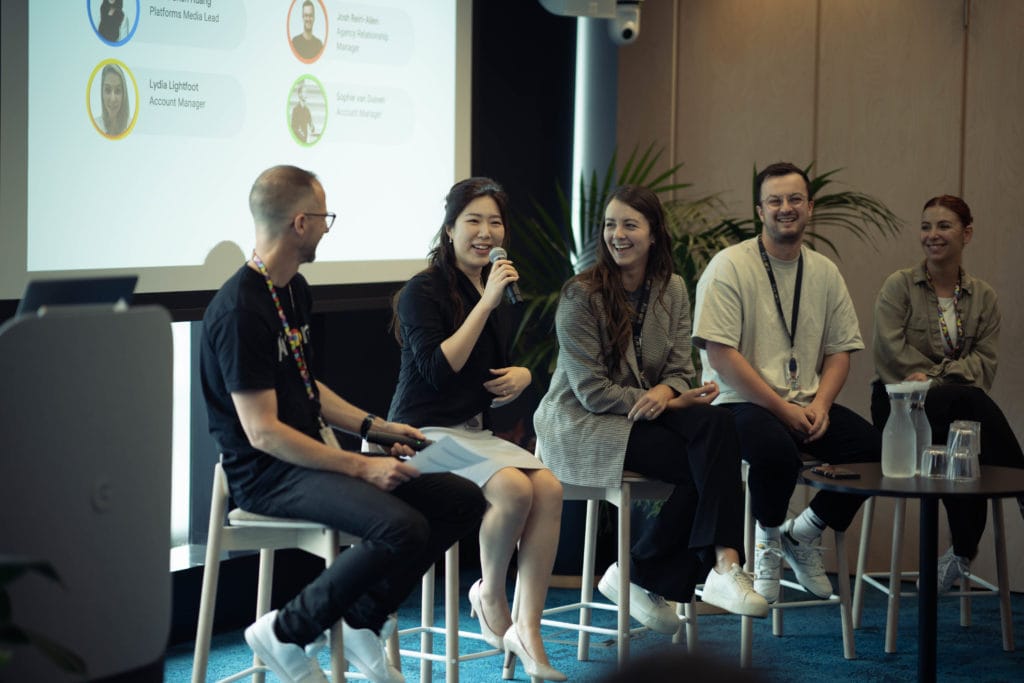Ever wanted career advice from a Google employee? Look no further!
Emma Shen Huang works in Google New Zealand as a Programmatic Media Lead. She has work experience across Japan and New Zealand. Her skills lie in Programmatic Media, business development, marketing, and e-commerce – just to name a few.
So how did Emma land a job, and promotion, at one of the biggest tech companies in the world? Check out her 8 tips for career success below, specifically tailored for women and women of colour hoping to break into the industry.
1. Be your own entrepreneur/self-starter
Emma describes Google as a diverse, fast-paced company.
“All the individuals who work for Google are not only very intelligent, but they are also creative and know how to collaborate effectively with one another. Everyone I’ve met while working for Google has displayed a positive attitude and leadership. Everyone’s extremely hardworking as well.
People build culture. Because all Googlers display these great attributes, it builds the overall Google culture in a very diverse, positive way.”
While she agrees that Google’s workforce is made up of high achievers, she also explains that the company seeks out self-learners.
“At Google, you must be selfless, a self-learner, and know what you can do to help collaborate effectively, putting the user first. What can you do every day to make sure that you are benefiting not just the company, but the people who use our product or services?”
An essential tip for tech success is to be a self-starter; defined as “a person who begins work or undertakes a project on his or her own initiative, without needing to be told or encouraged to do so.” While Emma reassures that all Googlers receive guidance, they also need to be independent:
“You need to think of what you can do to improve your skills and your knowledge, to then help contribute to the overall team and the business as well as to the end-user or clients.”
This isn’t an industry, or company, that suits people who aren’t willing to think outside of the box.
“In any industry, building your skills, knowledge, resilience, and persistence is very important. Especially if you want to work for a fast-paced company in tech, not just Google, but any tech company; you need to be comfortable with change. What you will realize is that if you’re always stubborn with one way of doing things; you might find it challenging in the tech industry, because of how fast evolving it is.”
2. Get a mentor
Emma notes her career success has been thanks to great guidance provided by the many mentors she has had over the years. A mentor is someone who shares knowledge and provides guidance in a 1-1 setting. Sponsors are also vital, as they understand your abilities and can advocate for you.
“Having a mentor in your life is very important. I’ve personally had several female and male mentors in my life, and I still do. I truly feel that if you have a mentor, it will fundamentally change the way you think about things.”
Mentors have helped Emma when she is stuck, struggling, or when she needs a word of affirmation. She recommends having a variety of mentors.
“I think female mentors can offer something very different to male mentors. Female mentors may be able to guide you around things a woman might struggle with; for example, work and life balance of juggling looking after kids and excelling at work.
If you find a mentor who has a similar experience, maybe they can guide you with methods that worked for them. But in saying that, everyone has different strengths. And each mentor would bring different values to you.”
Emma ensures her range of mentors can help her in different areas she needs support on, to ensure she receives a variety of values and viewpoints.
3. Follow industry news
It’s crucial to know what’s happening in your industry. That’s why Emma recommends you follow your industry’s news.
“This is very important for whichever industry you’re in. It might not even be tech – even if you’re in the medical industry or food industry, you want to always be up to date.
Whenever you have time to scroll through the internet, check relevant industry news, it’s very important to level up quickly in terms of what’s been happening. Which becomes crucial when you’re talking with your colleagues or clients to discuss current industry news.”
Some great blogs we recommend are StopPress; Idealog; Marketing Magazine; Campaign Brief and Learn with NZIE on LinkedIn.
4. Have a backup plan
There is fear and doubt in the air concerning AI’s impact on the digital marketing and tech industry: will it take our jobs, making us irrelevant?
“The way different industries are shifting towards AI, there will be certain jobs where AI might take over and humans may not be needed. But in saying that, society will continuously evolve, so even with those changes, there will always be somewhere where humans are needed. I don’t think that we should be too scared of what’s going to come regarding AI. We should be excited about it!”
While we should get excited and remain optimistic, there are many articles that mention how certain fields should be prepared for changes soon. People who have operational jobs might be more impacted. You might want to think ‘What other skill sets can I gain in case I lose my job?’ Having a backup plan or finding areas to develop yourself will be the key.”
Emma invites you to reflect on how you can future-proof yourself.
“One thing I would say to everyone is to think: What is your backup plan? Which areas can you develop? What are you passionate or curious about, that you want to continue pursuing? If you stay in one job for a long time, you’ll probably feel that you’ve mastered that job. You might want to go to a different company or find a different job. It’s a matter of us constantly evolving and thinking of what skills we need to gain.”
5. Attend networking events and support groups
In her career, Emma has experienced some challenges not only due to the glass ceiling but also due to the bamboo ceiling.
“The bamboo ceiling is like a glass ceiling, but for Asians. They say that in some companies being not just a woman, but a person of colour or having an Asian background can limit your possibility of moving up the ladder. This is because of stereotypes or cultural differences that can lead to very different communication styles and behaviours in the workforce.”
Her top tip if you are experiencing the glass, bamboo or any other type of ceiling, is to find a support group of people experiencing a similar thing.
“For many years now, there’s been a lot of different support groups, networking events and leadership events for women and women of colour.
If you are a woman of colour, or if you’re a woman in tech, attending those networking or socializing events, and finding a strong mentor or sponsor who is also a fellow female or woman of colour, who is an amazing leader in the industry may be able to help you navigate issues in your workplace.”
“Within Google, We have an amazing group called Asian Google network where we collaborate to work through mutual challenges, create further awareness, and to celebrate diversity.”
She also says talking about it and bringing awareness makes a huge difference.

6. Upskill: Know your strengths and tackle your weaknesses
Most of us wish we read more books, but Emma agrees it can be hard to find the time. What are some other ways we can upskill in our field?
“I love to search for a lot of things on Google and YouTube. I know that many people use YouTube as a how-to guide. If you want to learn more about a subject, and if you’re more of a visual and audio person, I think YouTube is a great place to learn. You can look up how to do something, or if you want to search about a relevant topic, then you can get tons of videos that you can go through and try to upskill a bit more about the topic.”
While Emma stands by her advice of finding a mentor, sponsor and attending networking events and support groups – it’s important to always put in self-effort.
“I try to attend some online leadership courses or communication courses because at the end of the day, only you can help yourself. You can have mentors and sponsors, but you must step up by yourself and get others to hear your voice. It’s up to you.”
Upskill with NZIE’s range of courses, from short courses to a full Diploma in Digital Marketing.
7. Create a Personal Development Plan
Working at one of the largest tech companies in the world, Emma is often asked how she scored a job at Google. She says people should reflect on whether they just want to work for a big tech company, or what it is that they want out of life and their career.
“Fundamentally think about what the most important thing in your life is. Is it to pursue a high-paying job? Or is it to build the skill set, experience, knowledge, and expertise that you want to build on?
The perfect scenario is if you know what you want and if that company offers what you’re looking for; then you have a perfect job. But a lot of the time, many of us don’t know what we truly want to do. But we need to find a job. So, we try to get a high-paying job, or we try to do something that we’re comfortable in.”
She admits that she doesn’t have a picture-perfect career plan. In saying that she makes sure to always reflect on her 1-year, 5-year, and 10-year plans. Plus, at Google, employees are recommended to work on their PDP (Personal Development Plan) with their manager annually.
Emma recommends talking to your coach/mentor, to reflect on one main thing you want to achieve in life, and then to work backwards from there to find your dream job or outline skillsets/experiences you should gain.
8. Get comfortable self-advocating
Throughout Emma’s career, she often struggled with self-advocating, on how to present yourself and your achievements while being humble. This is often challenging especially for women – and people may sometimes feel like they have imposter syndrome.
“You must believe in yourself. To gain self-confidence, you need to know: what do I do well, and what are the areas I lack? For areas you lack, you can try to upskill by learning more about it, but also strengthening your strengths is a great way to then use that as your weapon to self-advocate.
For women and women of colour, adopt this mindset: ‘I might be younger than you, I might be a female, I might be a woman of colour, but I can do the job as well as others.’
She says working on self-advocacy can lead to successful job interviews and more confidence in the workplace.
“In a job interview, you might only get half an hour to self-advocate. Sometimes it might be very uncomfortable to talk about or brag about what you have achieved in the past, or the things that you’re good at. It’s something that you must learn to be comfortable with.
I wouldn’t say I’m still comfortable with self-advocating. But I try to do it in those situations where I need to do it. It’s just a matter of throwing yourself out there and believing that you can do it.”
You can follow Emma on LinkedIn to see her activities and the journey she takes. Keep an eye out for the next NZIE x Google Digital Academy.


